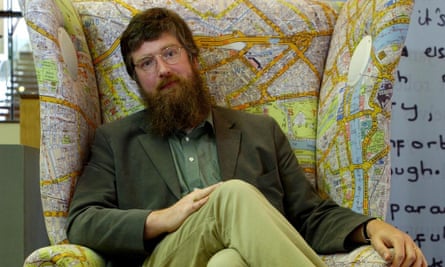Poet and novelist Michael Rosen has spoken out about the vital importance of humorous literature for children after announcing that the book award he founded seven years ago, the Roald Dahl Funny prize, is being closed down.
Former children’s laureate Rosen tweeted yesterday evening (22 September): “This is a formal announcement: the Roald Dahl Funny prize is no more. It is deceased. Gone before. It is a late prize. Not funny any more.” He told the Guardian this morning that the Dahl family’s plans “did not include the Funny prize” any longer, and that the charity Book Trust had also decided not to continue running the award.
The prize had previously been placed “on pause”, with plans to relaunch it next year, but Rosen said it had now been decided that there was “no room” for the prize. The Dahl estate’s managing director, Luke Kelly, told The Bookseller that the prize would not be awarded again because it does not fit in with plans for celebrations around Dahl’s centenary next year, and that the estate would be focusing on a new children’s book prize to be launched in the US. “The Roald Dahl Funny prize has served its purpose brilliantly,” Kelly told the magazine.
Rosen set up the award in 2008 when he was children’s laureate, “because funny books often get overlooked when it comes to prizes”. Won by writers from Andy Stanton to Louise Rennison and Liz Pichon, it is beloved by children’s authors and booksellers, who were mourning its demise this morning.

“Never has there been a more important time to champion the funny. In a world of turmoil, a chance for children to lose themselves in chuckle-packed pages is a valuable thing,” former winner Philip Ardagh, who took the prize with Jim Paillot in 2009, for Grubtown Tales: Stinking Rich and Just Plain Stinky, said on Wednesday .
“Sometimes, humour is a great way to entice more reluctant readers to pick up a book, too. What’s more – and don’t tell anyone – funny books can tackle serious issues. To offer a prize for such books – which are nearly ALWAYS ignored by the other book prizes – gives them value, worth and helps to spread the word. The Roald Dahl Funny prize was great, but we mustn’t waste any time looking for a successor,” Ardagh added.
Rosen, who is also professor of children’s literature at Goldsmith’s University, where he gave his first lecture on humour in children’s books, said he was now planning to set up an event celebrating funny books, which would also look at how to get the award up and running again. “The issue with prizes is money – you need a sponsor, and a secretariat to run the thing,” said Rosen. “So the event is now my plan, and if by chance off the back of it some friendly sponsor comes along, I’ll be up for it.”
The bestselling writer stressed the importance of funny literature in getting children reading. “We keep talking about ‘reading for pleasure’ – it’s almost official government policy ... A substantial part of that for young children is reading funny books ... They’re a bridge to enable children to be confident with the written word,” he said.
According to Rosen, “we rarely talk about laughter. We’re northern Europeans – we shouldn’t laugh too much unless we fart. There is a reserve. And there are worries about children laughing hysterically, because they’re ‘out of control’.”
But, he said, “humour through literature is an excellent way to release energies we have”, and “lots of humour relies on subversive ideas”, with Dav Pilkey’s Captain Underpants titles “subverting education quite a lot – there’s a headteacher running around in his underpants looking like a baby”.
Rosen also pointed to Dahl’s The Twits. “They’re totally out of control – it’s a parody of married life. Dahl was looking at the world of adults, through a child’s viewpoint, without any children being there. It’s a very, very cunning book about adult life getting out of control,” he said.
“Obviously there are a lot of rewards for writing serious, clever, powerful books, and I’m all for that. But we don’t give equal weight to Captain Underpants, Liz Pichon or The Twits. We’re saying these are funny books, that are also saying profound things about the world, through cackling.”
Booktrust chief executive Diana Gerald said this morning that “in the current financial climate it has been difficult to secure funding that would enable us to sustain the Roald Dahl Funny Prize but we are eager to continue to recognise the enormous contribution funny books make to children’s enjoyment of reading, and we will endeavour to look for new sources of funding to enable us to celebrate these important books.”
She added that the charity was “passionate about funny books”. “They are fantastic at getting even the most reluctant children to read and we feature them frequently in our recommended reads.”
Children’s books expert Fiona Noble called the decision “really sad news”, saying that “funny books are so important to children, and this was the one UK prize that celebrated that”.
“Look at any children’s bestseller chart and it will be dominated by funny books, from Julia Donaldson to David Walliams and Holly Smale. Only last week, 63% of the children surveyed by the Scholastic Reading Report said that ‘a book to make me laugh’ was what they most looked for when selecting titles. And yet funny books are seldom recognised by the other big children’s awards, which is why the Roald Dahl Funny Prize was so precious,” said Noble. “The volume of children’s books published today can be overwhelming, and award shortlists are a really useful tool for parents, teachers and librarians. In just a few years, the Dahl Prize made a huge impact. Let’s hope a new sponsor can be found.”

Comments (…)
Sign in or create your Guardian account to join the discussion